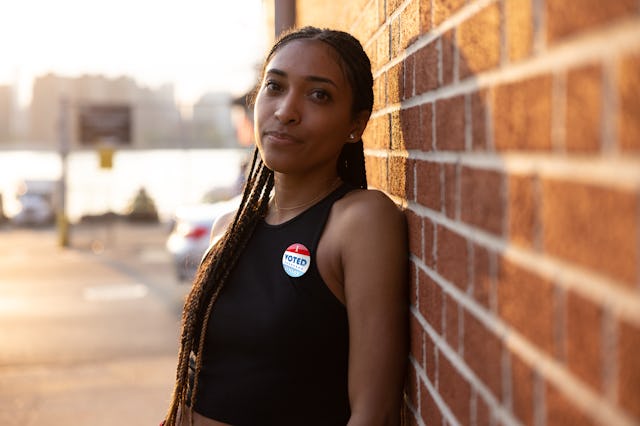New Study Finds That Girls Who See Women Run For Political Office Are More Likely To Vote As Adults
“When they see women run, young women receive a message about the openness of the political system to people like them.”

Is the news awful? Yes. Does every day bring new horrors? Totally. Would you like some good news for your feed? You’re begging? Great, because we have some! Us ladies might not have made it to the White House just yet, but it turns out, the effort isn’t in vain. A new study has found that even simple exposure to women running for political office during girls’ adolescence can increase their likelihood to vote as adults.
The University of Notre Dame study followed over 6,000 teens into adulthood, and found that teen girls who were exposed to a female candidate running a high-profile, viable campaign for office in 2002 were 4 points more likely to vote in their first eligible presidential election.
The effect was even more profound among teens in less political households. Among teen girls who reported never speaking with their parents about politics, those who were exposed to a competitive female candidate were 10 points more likely to vote in their first eligible presidential election than those who were not.
The study noted that women politicians have long expressed hope that they could serve as role models for young girls, and proof that women have a place in politics. During the 2020 presidential primaries, Sen. Elizabeth Warren (D, MA) asked girls to pinky promise that they would remember that “running for president is what girls do.”
Former Governor Nikki Haley (R, SC) shared a similar sentiment during her 2024 primary race. “When these girls see me, they just want to see what they can be,” she said.
Previous research has shown that exposure to female role models has increased young girls’ interest in male-dominated fields like science, technology, engineering and math. The Notre Dame researchers set out with the study to find if the effect translated to another field where men are overrepresented: politics.
The researchers used data from the U.S. Department of Education’s Educational Longitudinal Study, which surveyed 15,000 10th graders from across the nation in 2002. They determined whether the participants were exposed to female candidates based off of their geographic location during the initial survey. They then used data from a follow-up survey conducted in 2012, which included 6,740 participants, and asked whether they had voted in presidential or other elections.
The study found that female candidates did not even have to win their races to have a positive impact on girls’ likelihood to vote.
“Running, not winning, matters,” the study said.
The researchers explained that their theory of why role models work doesn’t even require girls to actively pay attention to politics.
“When they see women run, young women receive a message about the openness of the political system to people like them and about the capacity of women for politics. They accept this message by storing the information in their memory, perhaps even forgetting the source of the message,” they explained. “Then, when deciding whether to engage in politics themselves, they sample from the messages in their memory storage. The more examples they have stored of women in public life, the more women might view political participation as appealing and accessible.”
The researchers noted that their findings were conservative. More research could be done to determine if female role models in politics increased civic engagement beyond voting, which is already the most common form of political participation. They also noted that women’s issues were less of a focus during the 2002 elections than in others, and that looking at teens who came of age during an election cycle that engaged more with women’s issues could reveal even greater impacts.
So much has changed since 2002. Since then, three women have run on competitive presidential tickets — something that hadn’t previously happened since Geraldine Ferraro ran for Vice President in 1984. A whole generation of girls have grown up seeing themself in the running for the most powerful office in the country, and have run to the polls, too.